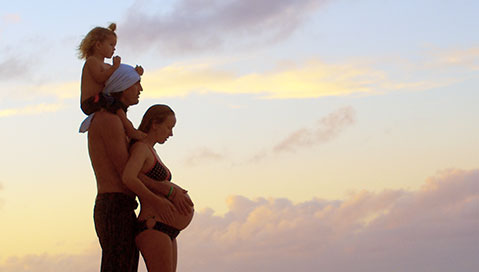SBIFF: Day 3
Around the World, on the Child’s Eye Plan

A fine, positivity-powered way to start out a long Saturday at SBIFF: Going on a 90-minute world tour with Given Goodwin, the tiny but mighty, powerfully charismatic child and sole narrator of the beautiful sort of documentary Given. Director Jess Bianchi and a compact, ultra-mobile crew (with three helicopters at the ready for gorgeous aerial work), embarked on a year-long globe-spanning adventure with his childhood friend from Hawaii, Aamion Goodwin, his pro surfer wife Daize and their young family, with six-year old Given as the protagonist and point-of-view.

The Goodwins headed out from home base in Kauai and ventured to Iceland, Thailand, points in Africa, Nepal, and beyond, and finally to a heartwarming and big fish-landing finale in Fiji. What results, is a vagabond surfer family saga blessed with the idealistic and warmly naïve viewpoints of a child’s eye view of life and the world, but also a visually stunning tribute to the wonder of the planet we inhabit. Ironically, this profoundly pro-global film arrives at a time when America is being threatened by an ominous specter of xenophobia from the Houses of Power.
A post-screening Q&A included Daize, her young daughter, True, and director Bianchi, who explained that he intentionally avoided dramatic conflict in the film. “A lot of films have unnecessary conflict to move the drama along,” he said. “But I wanted to show that you can focus on the positive.” Daize added, “We live in a world that is fear-based, especially with everything going on, but people were so warm and kind wherever we went.” She went on to speak of the importance of making sure that her children “live a life of a light and love,” and that grassroots action is critical at this vulnerable historical moment. “We have to be the change. It sounds clichéd, but it’s true. We can make things happen.”
Attention Donald Trump: listen up to what the wee sage Given has to say.
Speaking of which…Trump awareness just won’t go away, even for festival-obsessive SBIFF escapees. Another irony linked to the program is that one of the strongest films on the slate, the Iranian The Salesman, is among the several Foreign Oscar-nominated titles, but respected director Asghar Farhad — who won the Oscar for his The Separation — is unable to appear at the Academy Awards, thanks to the trumped-up travel band. In this deft and very slow-brewing thriller-style tale, an Iranian production of Death of a Salesmen intersects, in disarming ways, with real world goings-on. The artifice and mythos of theater (with which the director has had serious dealings) and “real life” cross-reference each other, but in ways we’d never see in Hollywood.
One of the more haunting, and haunted, performance of SBIFF so far has to be that of Andreas Döhler in the role of tortured protagonist Markus in the German film Hands of the Mother. This powerful and unique film addresses a rarely broached subject — sexual abuse by a matriarch — rather than the much more typical male predator. It’s not a plot-spoiler to report that director Florian Eichinger’s film is all about nasty, injurious abuses suffered in childhood, realized and revisited in emotional depth-charge fashion decades later. As with Danish director Thomas Vinterberg’s Celebration, the underlying theme has to do with the lingering, traumatic effects of parental sexual abuse on individuals in their adult years and also the larger family fabric, which may benefit from a collective confrontation with unpleasant truths.
Actor Döhler achieves something miraculous with his slowly unraveling performance in his role as a fully grown man suddenly besieged with unfolding memories of his mother’s sins against him as a young child, including scenes with him appearing as an adult in murky but painful memories. Director Eichinger, who has now completed a trilogy of films about the lingering aftermath of family abuses, and that “with something deeply hurting early in your life, it can become a part of your life.” But, story and relevant themes aside, Döhler has issued an eerily masterful stroke of a performance, even for its own sake.
What to See File: The weekend’s SBIFF dance card is a dense one, and to quickly highlight a handful of films I’ve seen and can vouch for, in rough order of quality and power to move: I am Not a Negro (best of the fest, so far), the Swedish films Sami Blood, and Strawberry Days, the Czech commie-era semi-comedy The Teacher, and Dominican Republic mean streets (meets hope) story, Jeffrey. For unabashed feel-good froth, proceed to Soof 2, Dutch director Esme Lammers’ sequel to her populist favorite of the 2015 SBIFF fest (warning: savory epicurean cinematography akin to food porn may activate hunger pangs).



